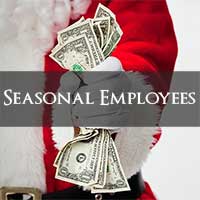 New Jersey has a bi-annual influx of seasonal workers each year that rely on additional jobs to bolster annual income. Between May and September, the Jersey Shore hires lifeguards, retail workers and restaurant employees to cater to the summer vacation crowd. For the holidays, many New Jersey retailers once again increase their payroll to include additional seasonal workers from October through January.
New Jersey has a bi-annual influx of seasonal workers each year that rely on additional jobs to bolster annual income. Between May and September, the Jersey Shore hires lifeguards, retail workers and restaurant employees to cater to the summer vacation crowd. For the holidays, many New Jersey retailers once again increase their payroll to include additional seasonal workers from October through January.
Seasonal employment means a boon for workers who need extra cash and for the towns who rely on the surge in spending during these times of year. However, being a seasonal employee does not necessarily mean that you are eligible for equal legal rights as an employee.
Seasonal employment in New Jersey is defined as work that is performed or 36 weeks or fewer, per calendar year, and is based on seasonal need or local draw. Seasonal employees may face different rules for overtime and unemployment than regular year-round workers.
For most year-round jobs, part-time status is defined as less than 35 hours per week, where full-time status consists of 40 hours or more. Part-time employees are usually covered by overtime laws that require an employer to pay time-and-a-half or a similar increase in pay for hours worked over the set minimum. However, if you are a seasonal employee, part of your employment contract may stipulate that the job requires additional hours without additional pay.
Likewise, seasonal workers may not be eligible to collect unemployment during the off season between jobs. While the federal government has named public school teachers and professional athletes as two categories who may not legally file for unemployment during the months they do not work, they leave all other seasonal jobs up to the discretion of the state.
In New Jersey, there is a proposed bill that, if passed, would prohibit any seasonal employee from collecting unemployment benefits during the off-season. The bill claims that seasonal employees know that they are seasonal workers, therefore they have not been let go or downsized, which precludes them from receiving state tax dollars for unemployment.
It is important to review your employment contract up front when you sign on for seasonal work so you know your rights. If you have questions regarding the validity of a claim as a seasonal employee, contact www.nyplaintiff.com to have the experienced NJ divorce attorneys at Castronovo & McKinney review your case.